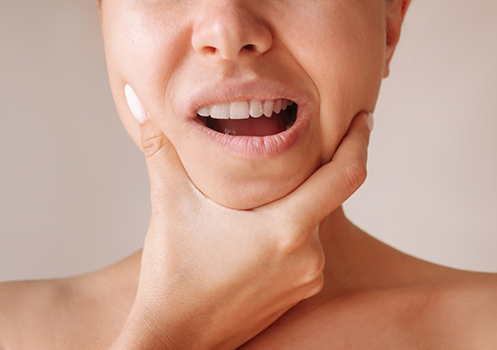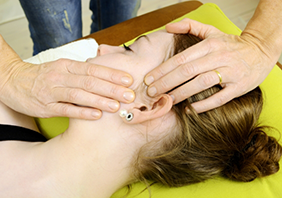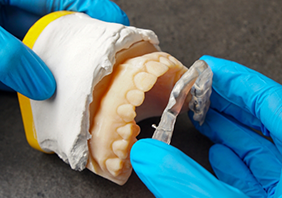TMJ/TMD Treatment Conyers
Relieve Jaw Pain with TMJ Treatment

Your temporomandibular joints (also known as TMJ) may be relatively small parts of the body, but they have an important purpose – connecting your lower jawbone to the skull, which gives you the ability to chew, eat, and speak. Unfortunately, this big responsibility means that even the slightest aggravation in this area can throw the system off-balance, resulting in facial pain and a variety of other uncomfortable symptoms.
If you’re a victim of TMJ disorder, Dr. Peters can assist you here in Conyers. With the help of effective treatment options, our team’s goal is to restore harmony to the TMJ so that you regain your full quality of life. Contact Hillcrest Dentistry to get started!
Why Choose Hillcrest Dentistry for TMJ Treatment?
- Newly Renovated Spa-Like Dental Office
- Local Dentist with a Conservative Approach to Care
- Dental Care So Comfortable You’ll Doze Off
What is TMJ Disorder?

TMJ disorder is a condition that impacts the two joints that hinge the lower jaw to the upper jaw, called the temporomandibular joints (TMJ). When these joints are stressed, overworked, or filled with tension, it can lead to dysfunction and a number of uncomfortable symptoms that make daily tasks like eating and speaking difficult. Dr. Peters can help diagnose the underlying cause of your discomfort and address your TMJ-related pain with equilibration or an occlusal splint.
Signs of TMJ Disorder

TMJ disorder is a complex condition, and no two instances of it are exactly the same. However, there are some common symptoms that patients should be on the lookout for, which include:
- Serious, chronic pain located in the jaw, face, neck, shoulders, and/or back
- Experiencing difficulty when trying to chew or open/close your mouth
- Jaw joints that constantly click, pop, or lock
-
Regular discomfort that feels like an earache
How We Treat TMJ Disorder

After a thorough evaluation, Dr. Peters will be able to determine whether you could benefit the most from occlusal adjustments or a custom-crafted occlusal splint. These treatments are designed to relieve pressure from your temporomandibular joints and restore balance to your bite, easing your pain.
Equilibration/Occlusal Adjustments

TMJ disorder has several probable causes, one of which is improperly fitted dental restorations. In order to reintroduce equilibrium to your bite, Dr. Peters may recommend occlusal adjustment. This is accomplished by carefully adjusting the surfaces of certain teeth or existing restorations in the mouth. As a result, your TMJ joints and jaw muscles should be subjected to far less strain than before.
Occlusal Splints

Alternatively, many patients develop TMJ disorder over time because of bruxism (teeth grinding). In order to combat this harmful health problem, a custom occlusal splint can be created in order to minimize dangerous contact between teeth as well as shift the jaw into its ideal resting position. Some patients can achieve permanent improvement through regular occlusal splint use.
